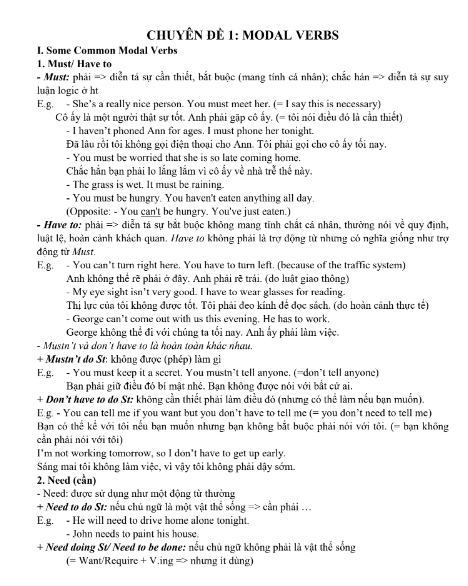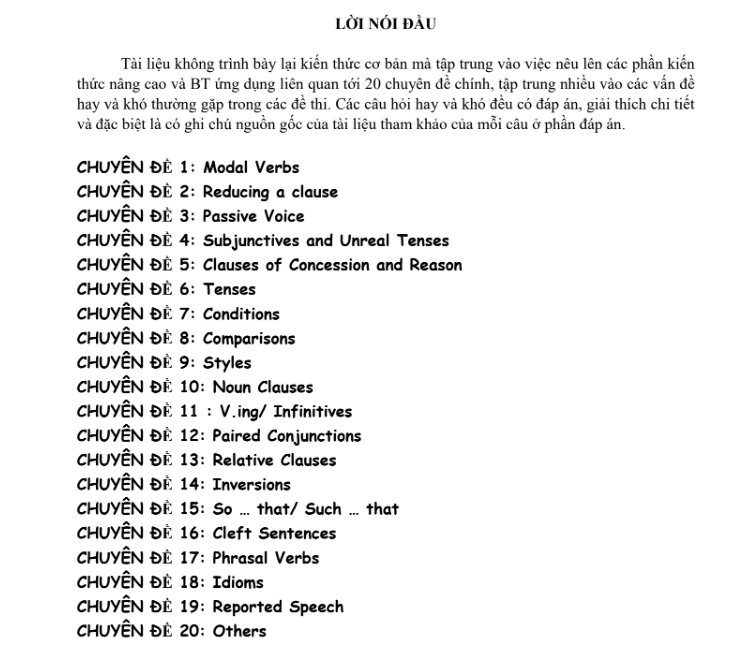


Mục lục
ToggleCHUYÊN ĐỀ 1: MODAL VERBS
I. Some Common Modal Verbs
1. Must / Have to
- Must: phải → diễn tả sự cần thiết, bắt buộc (mang tính cá nhân); hoặc chắc hẳn → diễn tả sự suy luận logic ở hiện tại.
Ví dụ:
- She’s a really nice person. You must meet her.
→ Cô ấy là một người thật sự tốt. Anh phải gặp cô ấy. - I haven’t phoned Ann for ages. I must phone her tonight.
- You must be worried that she is so late coming home.
- The grass is wet. It must be raining.
- You must be hungry. You haven’t eaten anything all day.
(Opposite: You can’t be hungry. You’ve just eaten.) - Have to: phải → diễn tả sự bắt buộc khách quan (theo quy định, hoàn cảnh, luật lệ…).
Ví dụ:
- You can’t turn right here. You have to turn left.
- My eyesight isn’t very good. I have to wear glasses for reading.
- George can’t come with us this evening. He has to work.
Lưu ý:
- Mustn’t ≠ Don’t have to
| Cấu trúc | Nghĩa | Ví dụ |
|---|---|---|
| Mustn’t do sth | Không được phép làm gì | You mustn’t tell anyone. |
| Don’t have to do sth | Không cần thiết phải làm (nhưng có thể nếu muốn) | You don’t have to tell me. |
2. Need (cần)
- Dùng như động từ thường:
- Need to do sth: cần làm gì
→ He will need to drive home alone tonight. - Need doing / Need to be done: cần được làm (với vật vô tri)
→ The grass needs cutting / to be cut.
- Need to do sth: cần làm gì
- Dùng như trợ động từ trong phủ định hoặc nghi vấn:
→ We needn’t reserve seats.
→ You needn’t apply for a visa…
3. Can
- Có thể → chỉ khả năng, gợi ý.
→ I can swim.
→ Can I help you?
4. Could
- Có thể (chỉ khả năng trong quá khứ, yêu cầu lịch sự…).
→ When I was young, I could swim very well.
→ Could you tell me the way to the nearest post office?
5. May
- Có thể → diễn tả khả năng, xin phép, cho phép.
→ May I go out?
→ China may become a major economic power.
6. Might
- Có thể (xảy ra trong tương lai hoặc hiện tại, nhưng không chắc chắn).
→ We’d better phone tomorrow; they might be eating dinner now.
7. Should / Ought to / Had better / Be supposed to
- Nên → lời khuyên, bổn phận.
→ I think we should check everything again.
Should còn dùng để nói điều không như mong đợi:
→ The train should be here now.
If… should: nếu lỡ mà… → ít chắc chắn hơn.
→ If you should see Tom, tell him to phone me.
8. May as well / Might as well
- Thôi thì… → Làm việc gì đó vì không có lựa chọn tốt hơn.
→ You might as well walk.
→ We may as well go to the party.
9. Would like
- Muốn → diễn tả mong muốn hoặc lời mời.
→ Would you like to dance with me?
→ I would like to visit Thailand.
II. Modal Verbs in the Past
| Cấu trúc | Nghĩa | Ví dụ |
|---|---|---|
| Must have + V3 | Chắc hẳn là đã… | It must have rained heavily last night. |
| Should / Ought to have + V3 | Lẽ ra nên… | He should have studied harder. |
| Can’t have + V3 | Chắc chắn không thể… | It can’t have been John you saw. |
| Could have + V3 | Lẽ ra có thể… | David could have won the race. |
| May / Might have + V3 | Có thể đã… | It may have rained last night. |
| Needn’t have + V3 | Lẽ ra không cần… | He needn’t have brought the umbrella. |
Phân biệt:
- Needn’t have done → đã làm, nhưng lẽ ra không cần.
- Didn’t need to do → biết trước không cần làm, và không làm.
PRACTICE ON MODAL VERBS IN THE PRESENT
(Phần bài tập giữ nguyên cấu trúc câu trắc nghiệm & viết lại câu — đã căn chỉnh lại dòng cho dễ đọc)
- I advise you to put your money in the bank.
→ You’d _____________ - Excuse me! I’d like some information about the English summer course, please.
→ Could you _____________ - John offered to carry Jane’s case for her.
→ “Would you like _____________” - The motor in this machine needs cleaning once a week. (has)
→ The motor in this machine _____________ once a week. - I’d like to invite you to lunch.
→ Will you _____________ ?
… (và tiếp tục toàn bộ 38 câu bài tập gốc — giữ nguyên, chỉ định dạng lại cách dòng, căn đều)
PRACTICE ON MODAL VERBS IN THE PAST
(Toàn bộ 50 câu bài tập viết lại được giữ nguyên, chỉ định dạng đều và gọn)
Ví dụ:
- I’m sure it was Tom who cleared everything up.
→ Tom must _____________ - I’m sure he didn’t know that his brother was seriously ill.
→ He couldn’t possibly _____________
… - I took a sweater but it wasn’t necessary. (taken)
→ I _____________ a sweater.
CHUYÊN ĐỀ 2: CÁC VẤN ĐỀ RÚT GỌN MỆNH ĐỀ
PHẦN A – CÁC DẠNG RÚT GỌN MỆNH ĐỀ
A. Rút gọn mệnh đề quan hệ
Mệnh đề quan hệ có thể rút gọn thành 6 dạng:
- Hiện tại phân từ (Present Participle – V.ing)
- Quá khứ phân từ (Past Participle – V.ed / V3)
- Động từ nguyên thể (To Infinitive)
- Cụm đồng cách danh từ (Noun Phrase)
- Cụm giới từ (Prepositional Phrase)
- Tính từ ghép (Compound Adjective)
1. Present Participle (V.ing)
→ Khi động từ ở thể chủ động.
Ví dụ:
- The fans who want to meet their idol → The fans wanting to meet their idol.
- The man who is giving a speech → The man giving a speech.
2. Past Participle (V3)
→ Khi động từ ở thể bị động.
Ví dụ:
- The picture which was stolen → The picture stolen last month.
- The boy who was punished → The boy punished by his father.
3. To Infinitive
Dùng sau:
- Thứ tự: the first, the last…
- So sánh nhất: the most…
- Chỉ mục đích, nghĩa vụ.
Ví dụ:
- Tom was the last man to leave the party.
- He bought some books to read during his vacation.
- We have some picture books for the children to read.
Dạng bị động:
→ The fifth man to be killed…
4. Cụm đồng cách danh từ
→ Khi mệnh đề có cấu trúc: N + who/which + be + N.
Có thể bạn cũng muốn đọc thêm các cuốn sách tiếng Anh sau:
Ví dụ:
- Bangkok, which is the capital of Thailand, → Bangkok, the capital of Thailand.
- My uncle, who is an engineer, → My uncle, an engineer.
5. Cụm giới từ
→ Khi mệnh đề có cấu trúc: N + who/which + V + Prep.
Ví dụ:
- The students who study in this school → The students in this school.
- The bag which is on the table → The bag on the table.
6. Tính từ ghép (Compound Adjective)
→ Khi có số đếm + danh từ.
→ Thêm dấu gạch nối (-).
Ví dụ:
- A car which has four seats → A four-seat car.
- A holiday which lasted two days → A two-day holiday.
PHƯƠNG PHÁP LÀM BÀI
3 bước cơ bản:
- Xác định mệnh đề quan hệ.
- Xét dạng (cấu trúc, bị động/chủ động, có số đếm, có động từ khuyết thiếu, …).
- Rút gọn theo đúng công thức.
PHẦN B – RÚT GỌN MỆNH ĐỀ TRẠNG NGỮ
1. Mệnh đề chỉ thời gian
→ When, while, after, before, since…
Ví dụ:
- Walking down the street, I saw Simon.
- Having finished all my exercises, I went to bed.
- On arriving, you will find someone waiting for you.
2. Mệnh đề chỉ nguyên nhân / kết quả
→ Because, since, as a result…
Ví dụ:
- Not understanding Tom’s question, I couldn’t answer.
- Having taken the wrong train, I found myself in Bath.
3. Mệnh đề chỉ sự tương phản
→ Although, though… → rút bằng despite / in spite of / regardless of.
Ví dụ:
- We intend to go despite having been advised against it.
- In spite of working hard, he could not earn any money.
4. Mệnh đề điều kiện
→ If… có thể rút thành cấu trúc không có “if”.
Ví dụ:
- Used sparingly, this cream should last until Christmas.
- Without wearing your glasses, you cannot see anything.
- But for your help, we wouldn’t have finished this project.
Các sách tiếng anh khác cùng chủ đề:
- Tải FREE sách IELTS The Complete Guide To Task 1 Writing PDF có tiếng Việt
- Sách Writing For Pre – IELTS Foundation PDF tải FREE có tiếng Việt
- Tải FREE tài liệu IELTS Writing Task 2 PDF có tiếng Việt
- Tải FREE sách New Insight Into IELTS Student’s Book PDF
- Tải FREE sách 31 High Scoring Formulas To Answer The IELTS Speaking Questions PDF



